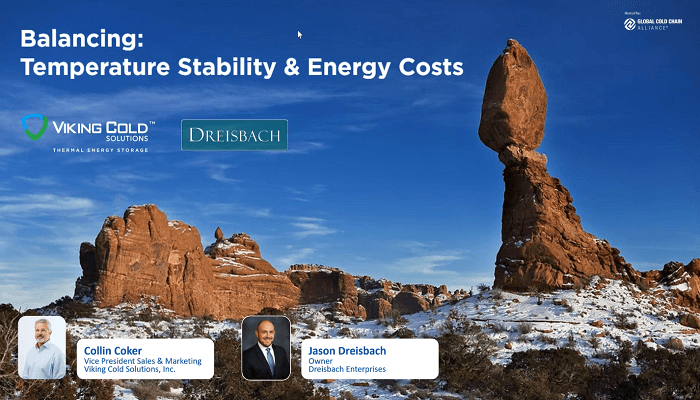
View the webinar playback here.


View the webinar playback here.

Utility Dive provides professionals with a bird’s-eye-view of the utility industry through industry news, original analysis, and published in-depth feature articles.
Viking Cold Solutions has been named as one of Energy CIO Insights‘ Top Ten Energy Storage System Providers for 2018. We are proud to join this prestigious list along side companies like ABB, Fluence (a Siemens and AES company), LG Chem, Toshiba, and other energy storage pioneers.
Every month, the San Diego Food Bank accomplishes the gargantuan task of providing food to over 370,000 people, nearly equivalent to the entire population of Cleveland, Ohio! Making this absolutely incredible operation possible are hundreds of devoted volunteers, millions of donated dollars, and a sustainability mindset.
Read More →
The 2018 Energy Storage Summit is being held February 27-28 in London, England. The Energy Storage Summit is attended by developers, financiers, utilities, networks and aggregators discussing standalone storage, co-located and C&I applications, top case studies from around the world with innovative business models and positioning of utilities, as well as completed EFR projects, co-location and utilities’ strategies.
James Bell, Viking Cold CEO, will be speaking at the Technology Comparison Session at the summit to ensure everyone knows that the cold storage market, formerly inaccessible because of its continuous, high electricity demand, now has an environmentally friendly and economical energy storage solution with thermal energy storage (TES).
James was interviewed prior to the show to share more about Viking Cold Solutions and the value the TES technology brings to operators and the utility providers. Click here to read the full interview.
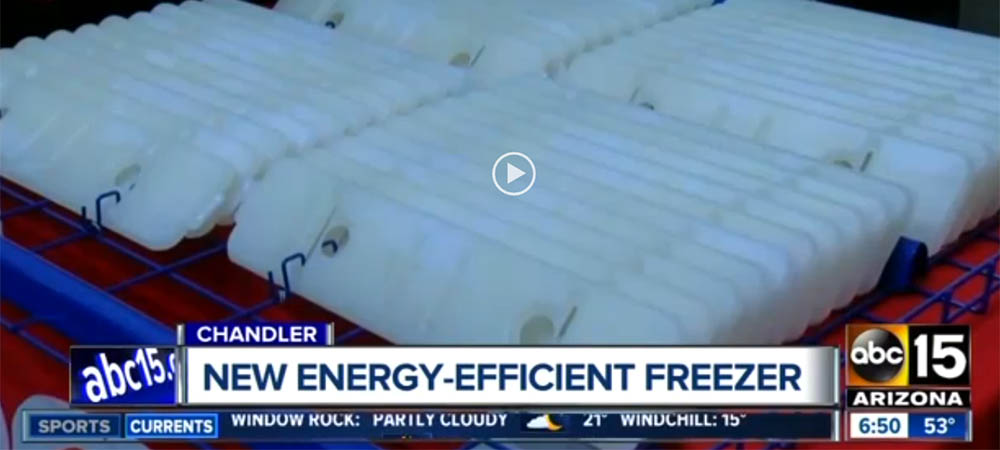
Local news crews captured the positive feedback from the client and the utility. Click the images to watch the videos.
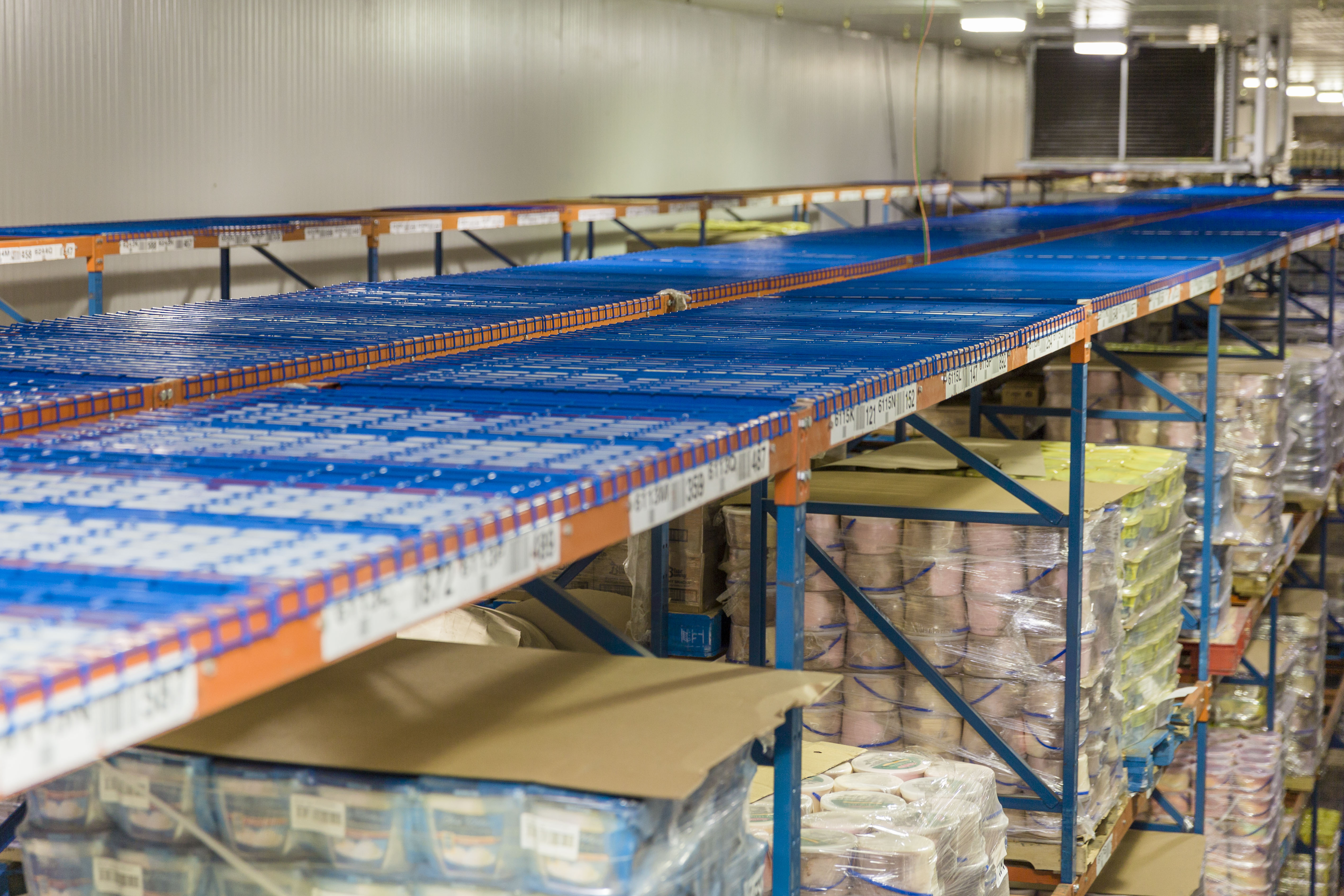
The TES system also reduces energy distribution and delivery challenges for SRP by shifting energy demand to night hours. The passive TES system stores energy at night for subsequent day use, enabling less refrigeration runtime and reduction of load during peak afternoon hours.
“We are very pleased to support this project with Bashas’ and Viking Cold Solutions and to evaluate a technology that shows potential as an energy management tool for us and our customers,” noted Nathan Morey, Manager of SRP Product Development. “SRP is excited to learn more about thermal storage technologies, which can provide energy savings for customers with industrial freezers like Bashas’ and provide long-term benefits to all customers by reducing peak demand during summer months.”
This project includes the installation of the Viking Cold Solutions Thermal Energy Storage (TES) system and 24/7 energy monitoring within the Bashas’ ice-cream freezer at their distribution center. “We continuously evaluate energy efficiency opportunities, as refrigeration is one of our highest operating expenses. We support technologies that provide greater temperature stability, helping us to continually provide low product prices to our customers. SRP is an innovative power utility, and we are excited about this partnership and glad we were able to come together to fund this project,” said Mike Basha, Vice President of Logistics at Bashas’.
SRP will also fund the third-party research analysis for the project, evaluating the TES system’s Phase Change Material (PCM) for its efficiency improvements and effectiveness at shifting energy load from on-peak to off-peak hours. SRP collaborated with Arizona State University’s School of Sustainable Engineering and the Built Environment, along with Nexant’s Utility Services Group, to measure the results of the project and extrapolate the potential impact of this technology on additional low temperature refrigeration loads in the Phoenix area. “Our students are excited to learn more about the potential energy savings and demand reduction impact of this innovative technology, as well as how it can be deployed in more facilities to support reductions in the Phoenix area’s peak load,” commented Kristen Parrish, ASU Assistant Professor.
“Cost effectively managing growing power grid demand and providing reliable and reasonable power prices to customers requires innovative solutions and collaboration from all parties – utilities, academia, industrial customers and technology providers. We anticipate that this project will provide a roadmap for deploying high-impact demand reduction solutions to refrigeration loads that were not previously accessible. As part of our commitment to cold-chain sustainability and reducing environmental impact, we are honored to be the enabling technology,” James Bell, CEO of Viking Cold Solutions stated.
About Viking Cold Solutions:
Viking Cold Solutions™ is a thermal energy management company that makes the world’s cold storage systems more efficient by using proprietary Phase Change Material (PCM) and intelligent controls. The company’s passive Thermal Energy Storage (TES) systems store energy, reduce demand, shift load, monitor customer facilities, and provide thermal back-up protection. The company’s patented TES systems have saved over 8,100 MWh of energy, reduced carbon footprint by over 4,400 metric tons, and prevented more than $13M of product loss. Learn more at vikingcold.com.
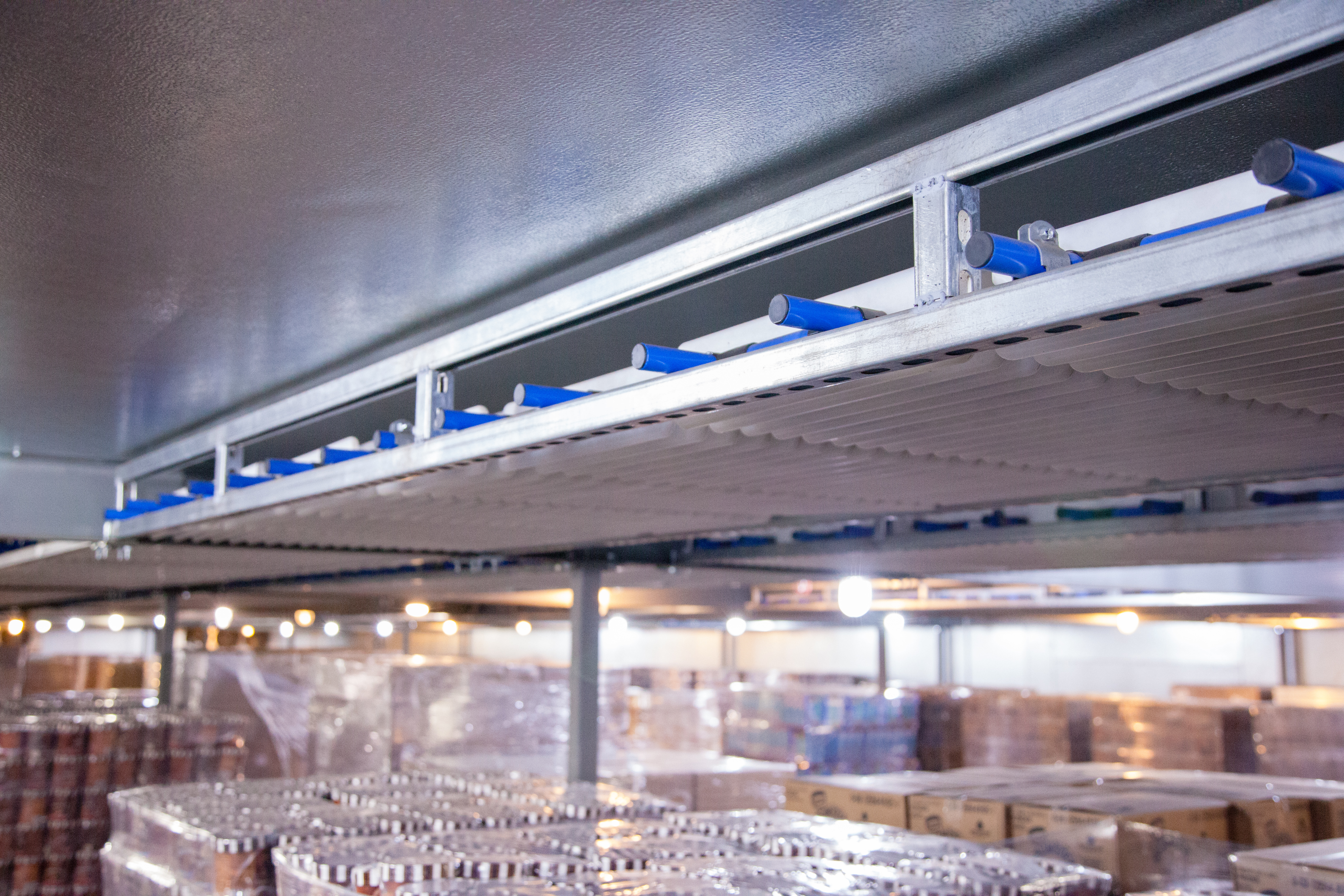
Frozen Gourmet, a dedicated Nestlé facility and a leading ice cream distribution company on the West Coast, has installed a Thermal Energy Storage (TES) system from Viking Cold Solutions™ and has reduced energy consumption over 27%.
Viking Cold’s patented Thermal Energy Storage system was installed at the end of 2016 and has reduced energy consumption by over 45,000 kWh since the beginning of 2017. The TES system also reduced peak demand charges by shifting electrical load to night time. The passive TES system stores energy at night for subsequent day use, allowing refrigeration to run less frequently and during off-peak rate hours. The result is significant cost and electricity savings, especially in California where expensive daytime demand charges are common.
“We searched for a year to find the right technology to reduce our energy costs and decided to purchase the Viking Cold TES system after seeing the capability and flexibility the system provides,” said Bill Kohn, CEO of Frozen Gourmet. “The reduction in energy consumption has improved our bottom line and the real-time monitoring has been invaluable in helping us recognize and address equipment issues before expensive problems arise.”
The Frozen Gourmet team has not only been able to reduce energy consumption but also maintain more stable temperatures inside their freezer with the integrated Viking Cold Energy Management System that monitors and optimizes the existing refrigeration equipment. Daily reports and alarm notifications alert the team in the event of temperature abnormalities, mechanical equipment failure, or power outages.
“Reducing energy consumption by 27% in a low temperature space is now possible with our passive Thermal Energy Storage system,” said James Bell, CEO of Viking Cold Solutions. “This technology is revolutionizing energy efficiency in the freezer space while helping to better protect the food with intelligent controls and sensors. There’s simply no other option available that combines efficiency and load management.”
In California, there is a $200 Million market opportunity for Viking Cold’s TES technology, which includes 570 million square feet of cold storage and approximately 8,210 grocery stores.
To learn more, watch Viking Cold’s 90 second video about how the TES works.
About Viking Cold Solutions:
Viking Cold Solutions™ is a thermal energy management company which makes the world’s cold storage systems more efficient using proprietary Phase Change Material (PCM) and intelligent controls. The passive Thermal Energy Storage (TES) solution stores energy, reduces demand, shifts load, monitors the facility, and provides thermal back-up protection. The company’s patented TES systems have saved over 8,100 MWh of energy, reduced carbon footprint by over 4,400 metric tons, and prevented more than $13M of product loss. Learn more at vikingcold.com.
Contact:
Collin Coker
VP Sales & Marketing
Viking Cold Solutions
+1-832-497-5205
ccoker@vikingcold.com
##############
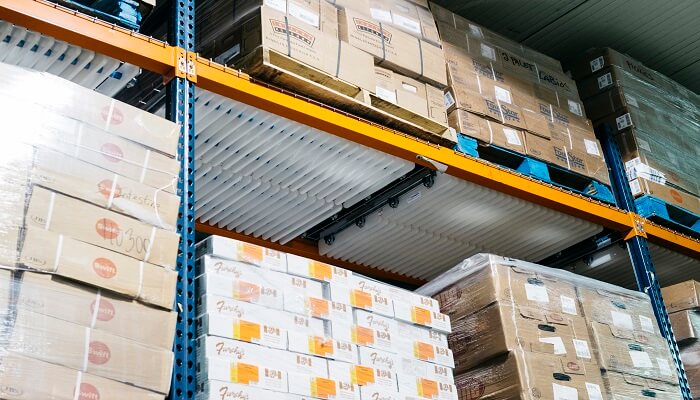
Read More →
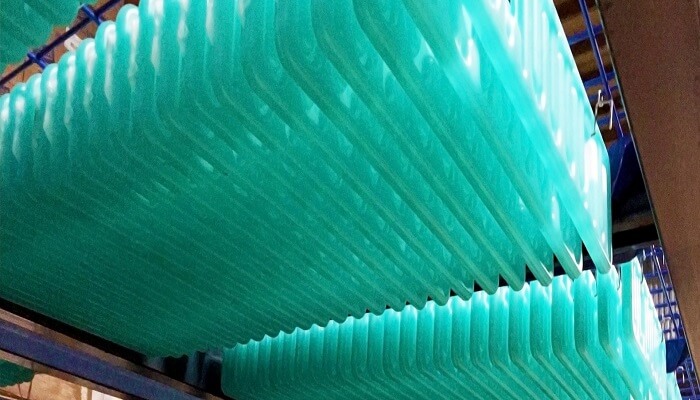
Houston, Texas – November 14, 2016 – Viking Cold Solutions, a leader in thermal energy storage systems, today announced that a Southern California Utility, along with an independent 3rd party energy management firm, ASWB Engineering, completed a Field Demonstration Study of the Viking Cold Thermal Energy Storage (TES) system. The study verified a reduction in electricity consumption of 30% and 39% in two separate low temperature cold storage facilities in the San Diego area. Based on the results of this study, the Utility and ASWB recommended that California utilities adopt the technology into their Energy Efficiency incentive programs.
The purpose of the independent study was to determine the effectiveness of Viking Cold’s patented TES system in cold storage freezer applications and to qualify the system for California utility inventive programs as part of the California Energy Commission Emerging Technologies initiative.
“The benefits of the technology include reduced refrigeration equipment run time and increased product safety during power emergencies due to the thermal storage capabilities of the solution.” said John Baffa, Professional Engineer at ASWB Engineering.
“It is exciting to see our technology recognized by a leading utility energy efficiency program and I’m pleased that the study validates the results that Viking Cold customers already experience daily.” said James Bell, CEO of Viking Cold Solutions. “Our passive, non-mechanical system is a cost-effective way to reduce energy consumption across the cold chain, from walk-in freezers to large distribution warehouses, which can be used stand-alone, or to boost the return with solar PV.”
Two locations currently using Viking Cold’s TES system were studied by ASWB. The first test site, a walk-in freezer on Camp Pendleton in Southern California, showed a net facility energy savings of 30%. The second test site is a commercial freezer warehouse at the Jacobs & Cushman San Diego Food Bank. By leveraging the Food Bank’s existing photovoltaic system to run the refrigeration during the day and using Viking Cold’s TES system at night, the facility showed a net energy savings of 39%.
“Electricity costs are one of the top two expenses in the cold storage industry and this study demonstrates the value of using an intelligent Thermal Energy Storage system to reduce energy consumption in freezers.” said Corey Rosenbusch, President and CEO of the Global Cold Chain Alliance (GCCA). “Based on these results, our membership should evaluate this technology for their own low temperature applications.”
The complete Phase Change Material and Controls Field Demonstration Study, written by ASWB Engineering, can be downloaded on the California Emerging Technologies Coordinating Council’s website at:
http://www.etcc-ca.com/reports/phase-change-material-and-controls-study-low-temp-refrigeration-applications
About Viking Cold Solutions:
Viking Cold Solutions™ is an energy management company, which makes the world’s cold storage systems more efficient using proprietary Phase Change Material (PCM) and intelligent controls. The Thermal Energy Storage (TES) solution stores energy, reduces demand, shifts load, monitors the facility, and provides thermal back-up protection. The company’s patented TES systems have saved over 7,000 MWh of energy, reduced carbon footprint by over 4,400 metric tons, and prevented more than $13M of product loss. Learn more at vikingcold.com
Contact:
Maddie Mansson
Director of Marketing
Viking Cold Solutions
+1-346-804-4363
mmansson@vikingcold.com